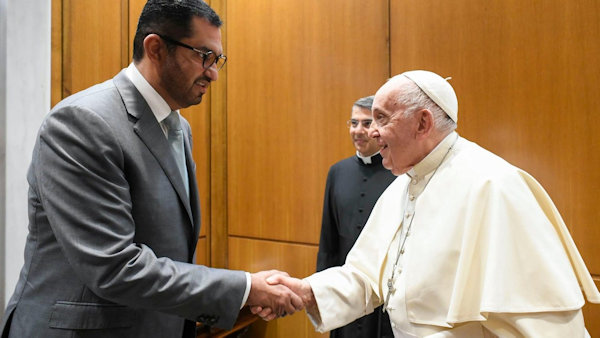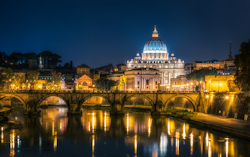SEJournal Online is the digital news magazine of the Society of Environmental Journalists. Learn more about SEJournal Online, including submission, subscription and advertising information.
 |
 |
| Pope Francis, above right, held an audience at the Vatican with Sultan Al Jaber, the president-designate of COP28, on Oct. 11, 2023. Photo: © Vatican Media. |
Feature: What Francis' Latest Climate Text Means for Upcoming UN Summit
By Brian Roewe
Since the 1992 Earth Summit and the start of the United Nations climate change conferences three years later, religious leaders have been regular participants in international efforts and deliberations to stem rising temperatures and to protect people and places most vulnerable to the impacts of a rapidly heating planet.
That includes the two most recent popes, Benedict XVI and his successor, Francis, who as head of the Roman Catholic Church has sent messages and delegations to meetings of the Conference of the Parties to the U.N. Framework Convention on Climate Change to press for decisive actions on global warming that preserve all forms of life and serve the common good.
But a pope has never set foot inside a climate COP. That might have changed had Francis' plan to arrive in Dubai on Dec. 1 to attend COP28 not been prevented by last-minute health problems.
Still, Francis is seeking to make waves within a process he sees as deeply in need of reform and course correction after years of impasse and incremental progress and with global emissions continuing to rise.
An apostolic exhortation on climate
Francis has earned widespread respect as a moral leader on the climate front.
“There is no doubt that the pope’s voice is one of the strongest in the world, if not the strongest,” Christiana Figueres, the U.N. climate chief who shepherded adoption of the Paris Agreement, told me earlier this year.
‘Along with … a very few others,
[Francis has] become the planet's
conscience on the climate crisis.’
— Bill McKibben
And climate activist Bill McKibben recently said, “Along with Greta Thunberg and a very few others, he’s become the planet’s conscience on the climate crisis.”
His new document, “Laudate Deum,” marks the latest effort by this pope to wield his stature to help spark a long-sought sea change in the global response to climate change. The apostolic exhortation — behind encyclicals but among the highest levels of papal teaching documents — is subtitled, “To all people of good will on the climate crisis,” eliminating any possible confusion about its focus.
It is the third document on environmental themes in Francis’ 10-year papacy, joining the landmark 2015 encyclical “Laudato Si’, on Care for Our Common Home” and the 2020 “Querida Amazonia,” an apostolic exhortation on the state of the Amazon rainforest.
Before issuing “Laudato Si’” in June 2015, Francis noted that he wanted to release it with enough lead time “that it [could] make a contribution” later that year at COP21 in Paris.
Reporting by National Catholic Reporter and an academic analysis revealed that delegates at COP21 repeatedly cited the papal document in negotiations and during speeches.
Figueres commended “Laudato Si’” for articulating the consequences of technical decisions that negotiators were debating.
Blunt criticisms, hopeful outlook
 |
| The Vatican formally joined the Paris Agreement in 2022. Photo: Justin in SD via Openverse (CC BY-NC-SA 2.0 DEED). |
At COP28, Francis again was looking to make an impact, once more beyond the confines of the Catholic Church — and this time perhaps even more substantial.
“This Conference can represent a change of direction, showing that everything done since 1992 was in fact serious and worth the effort, or else it will be a great disappointment and jeopardize whatever good has been achieved thus far,” the pope wrote in “Laudate Deum,” issued two months ahead of the summit, on the feast day of St. Francis of Assisi, patron saint of ecology.
The themes of “Laudate Deum” (“Praise God”), billed as a follow-up to Laudato Si’ (“Praise Be”), were expected to form the foundation of Francis’ speech on Dec. 2 during COP28’s high-level segment where he was to join other heads of state in addressing the expected 70,000-plus conference participants.
As with “Laudato Si’,” Francis clearly timed “Laudate Deum” to speak to negotiating parties in Dubai.
It also comes a year after the Holy See formally joined the UNFCCC and the Paris Agreement after previously holding observer status.
The new arrangement means the Vatican shares in the obligations, and scrutiny, every other country holds in slashing heat-trapping greenhouse gas emissions, but now also has a seat at the negotiating tables.
While maintaining Francis’ hopeful outlook, “Laudate Deum” is striking in the pope’s blunt criticisms of the multilateral processes that so far have yielded only slow progress in reducing emissions, with nations on track to double the Paris accord’s 1.5 degrees Celsius limit by century’s end.
In its opening lines, Francis notes it has been eight years since he issued “Laudato Si’,” “Yet, with the passage of time, I have realized that our responses have not been adequate, while the world in which we live is collapsing and may be nearing the breaking point.”
Reflections, facts and figures
The pope again centers his reflections on climate change on its consequences, saying that “it is indubitable that the impact of climate change will increasingly prejudice the lives and families of many persons.”
He also takes on climate deniers directly, citing reams of scientific studies and evidence unheard of in a papal text, while unraveling common climate skeptic talking points with the latest facts and figures (e.g., greenhouse gas concentrations hit 423 parts per million in June 2023).
At times, ‘Laudate Deum’ reads like a
summary of an IPCC report or an op-ed
from Michael Mann or Katherine Hayhoe.
At times, “Laudate Deum” reads like a summary of an IPCC report (which he cites repeatedly) or an op-ed from Michael Mann or Katharine Hayhoe.
Francis renews his critique of the “technocratic paradigm,” the idea that technological advances alone can solve major ecological challenges while preserving unlimited growth and exploitation of natural resources.
And at one point he singles out the United States, with the highest per capita emissions, as an example of “the irresponsible lifestyle” model of Western civilization.
But the pope spends the bulk of “Laudate Deum” brusquely laying out the problems he sees in global efforts to respond to the worldwide threat of climate change. One section is subtitled “The Weakness of International Politics.” Another highlights progress and failures from the U.N. climate conferences.
Francis both praises the Paris Agreement as a “significant moment” and “a new beginning,” and critiques its lack of enforcement mechanisms or sanctions for unfulfilled commitments.
A call for courage to make needed changes
Turning to COP28, the pope notes the oil and gas ties of host country United Arab Emirates before saying it would be “suicidal” to give up hope.
He lays out the stakes of the meeting in Dubai this way: “If we are confident in the capacity of human beings to transcend their petty interests and to think in bigger terms, we can keep hoping that COP28 will allow for a decisive acceleration of energy transition, with effective commitments subject to ongoing monitoring. … We must move beyond the mentality of appearing to be concerned but not having the courage needed to produce substantial changes.”
Francis’ speech was to have been one of the major early moments at COP28 to watch, but one the pope himself likely had hoped would be overshadowed by nations agreeing to significant outcomes, among them: more robust and binding climate pledges; fulfilled financing for developing countries; and a redoubling of urgency and ambition to avoid the most catastrophic impacts of climate change.
For a pope who’s carved out a reputation for surprises, there’s no knowing exactly what difference he ultimately can make.
What is clear, though, is that while “Laudate Deum” is the latest word from Francis on the threat of climate change, it likely won’t be the last.
Brian Roewe is the environment correspondent for National Catholic Reporter and its faith and climate reporting initiative EarthBeat. Based in Kansas City, Missouri, he has covered climate change and ecological issues for NCR since 2011, including reporting from Paris on the adoption of the Paris Agreement, from the Vatican on the Synod of Bishops on the Amazon, and from Honduras on the interconnections between climate change and migration. His journalism has received multiple awards, including from the Religion News Association.
* From the weekly news magazine SEJournal Online, Vol. 8, No. 43. Content from each new issue of SEJournal Online is available to the public via the SEJournal Online main page. Subscribe to the e-newsletter here. And see past issues of the SEJournal archived here.













 Advertisement
Advertisement 



